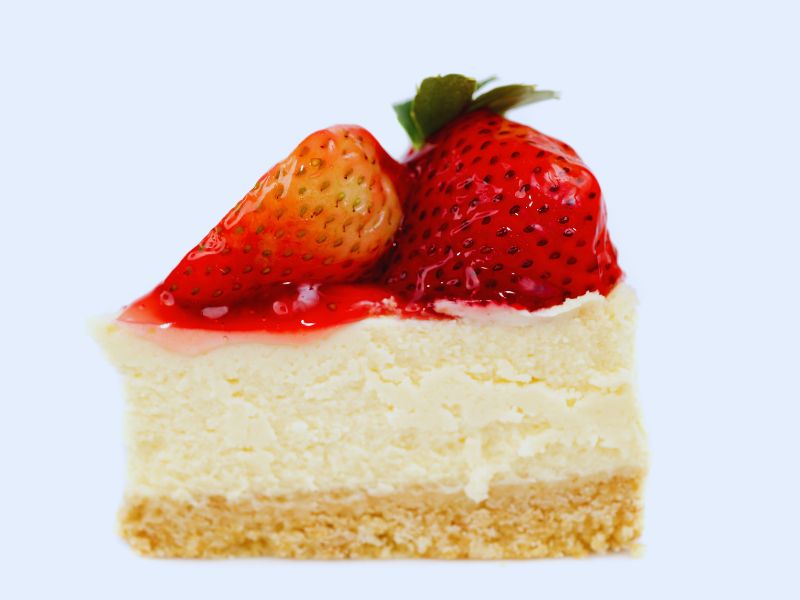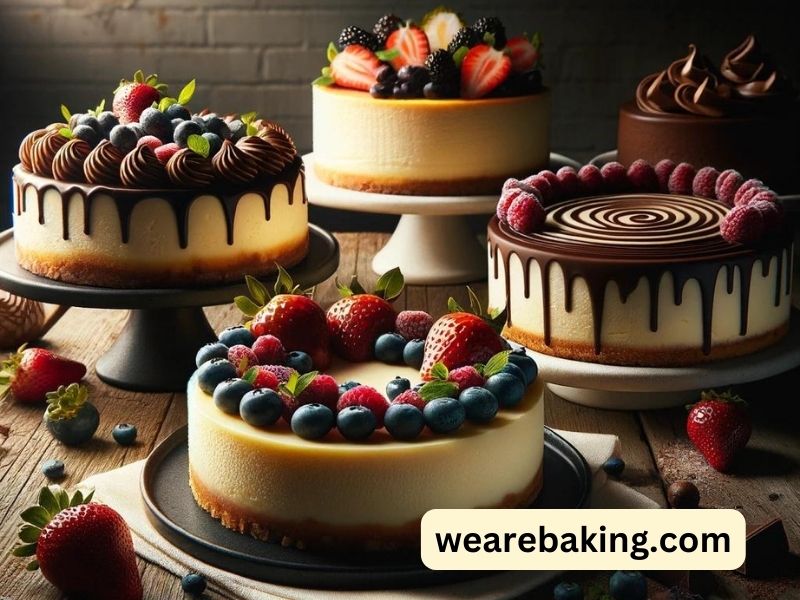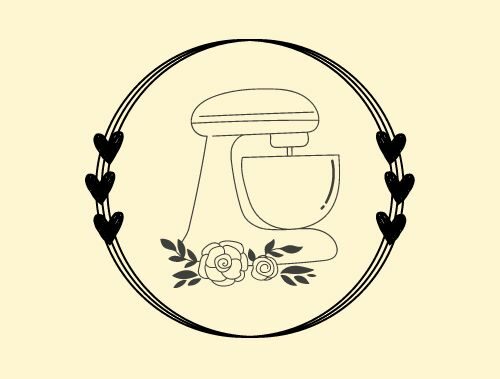Neufchâtel cheese can be a great stand-in for cream cheese in certain cheesecake recipes, but its lower fat content and slightly higher moisture levels may influence your cheesecake’s final texture and firmness. To get the best results, consider the type of cheesecake you’re aiming for and be open to making small adjustments to your recipe when swapping in Neufchâtel.
Neufchâtel vs. Cream Cheese
Neufchâtel and cream cheese are both soft, spreadable, and oh-so-creamy. But what sets them apart? Neufchâtel, a French cheese named after the region of Neufchâtel-en-Bray, is made from cow’s milk and has a smooth texture that’s similar to cream cheese. However, the main difference lies in their fat content and the way they’re produced.
Neufchâtel is made using lactic acid bacteria, which gives it a slightly lower fat content of around 23% milk fat. Cream cheese is made with a lactic acid culture and has a higher fat content of about 33%. While they might seem interchangeable at first glance, this difference in fat content can influence how they behave in recipes, especially when it comes to baking.
🧀 Cheese Comparison: Neufchâtel vs. Cream Cheese 🍰 |
|
|---|---|
| Neufchâtel Cheese | Cream Cheese |
| 🔹 23% Milk Fat | 🔸 33% Milk Fat |
| 🔹 Slightly Higher Moisture | 🔸 Lower Moisture |
| 🔹 Made with Lactic Acid Bacteria | 🔸 Made with Lactic Acid Culture |
| 🔹 Origin: France | 🔸 Origin: USA |
| 🔹 Slightly Tangier Flavor | 🔸 Mild and Creamy Flavor |
| Brought to You by “wearebaking.com” | |
Can I Use Neufchâtel in My Cheesecake Recipe?
So, you’re wondering if you can swap out cream cheese for Neufchâtel in your cheesecake recipe. The answer is yes but with a few considerations. While Neufchâtel can be used as a substitute, it might not be the perfect choice for every type of cheesecake.
Neufchâtel’s lower fat content can lead to a softer, less firm texture in your finished cheesecake. This is especially true for recipes that rely heavily on cream cheese for structure and stability. So, if you’re aiming for a dense, New York-style cheesecake with a rich, creamy texture, you might want to stick with traditional cream cheese.
But if you’re open to experimenting with a slightly lighter, softer cheesecake, Neufchâtel could be a fun ingredient to use. Just remember that you may need to adjust your recipe to account for the differences in fat and moisture content.
Tips for Using Neufchâtel in Cheesecake
So, you’ve decided to use Neufchâtel in your cheesecake recipe. But what’s the best approach? The answer depends on your baking expertise level and the cheesecake you want to make.
It’s generally a good idea for beginners to stick with cream cheese, especially if you’re making a classic cheesecake that needs a dense, firm texture. Trust me, you don’t want to end up with a soupy mess when you’re just starting out!
If you’re an intermediate baker and feel comfortable tweaking recipes, here are a few tips to help you successfully use Neufchâtel in your cheesecake.
- Neufchâtel has more moisture than cream cheese, so you’ll want to slightly reduce the amount of liquids like milk or cream in your recipe. This will help prevent your cheesecake from getting too soft or runny.
- To help stabilize your cheesecake and give it a firmer texture, add a small amount of cornstarch or xanthan gum to your batter. These ingredients will absorb some extra moisture and give your cheesecake more structure.
- Since Neufchâtel has a lower fat content, your cheesecake might be more likely to crack if you bake it at a high temperature. To avoid this, try slightly lowering the oven temperature and baking your cheesecake for a little longer. This gentler approach will help you get a silky-smooth cheesecake without any unsightly cracks.
Using Neufchâtel in your cheesecake recipe might take a bit of trial and error, but don’t get discouraged! With a little patience and practice, you’ll be able to create some delicious and unique cheesecakes that showcase the slight differences between Neufchâtel and cream cheese.
Beyond the Basics

Neufchâtel can be a great choice for lighter cheesecakes or those with specific flavors. Neufchâtel has a slightly tangier taste than cream cheese, which can complement certain fruits really well. For example, a strawberry or raspberry cheesecake made with Neufchâtel would have the slight tang of the cheese to balance out the sweetness of the fruit.
If you’re worried about your Neufchâtel cheesecake being too soft or unstable, you can experiment with different crusts. Instead of the traditional graham cracker crust, you could use a sturdier base like a shortbread cookie or a pretzel crust. The added texture and firmness from these different crusts can help support the softer filling and make for a really interesting flavor combination.
Another idea is to mix Neufchâtel with other cheeses like ricotta or mascarpone to create a unique, complex cheesecake. The possibilities are endless, so don’t be afraid to get creative and try something new!
To help you choose the right cheese for your next cheesecake masterpiece, here’s a guide to different cheesecake types and the recommended cheeses that best complement their textures and flavors.
🍰 Cheesecake Types & Their Perfect Cheese Match 🧀 |
||
|---|---|---|
| Type of Cheesecake | Recommended Cheese | Why It Works |
| New York-Style | Cream Cheese | For its dense, rich texture |
| Light & Airy | Neufchâtel + Ricotta | Less fat, fluffier texture |
| Fruit-Topped | Neufchâtel | Slight tang complements sweetness |
| No-Bake | Mascarpone or Greek Yogurt | Creamy with a delicate flavor |
| Brought to You by “wearebaking.com” | ||
Remember, baking is all about experimentation and finding what works best for you. So go ahead and play around with Neufchâtel in your cheesecakes – you might just discover your new favorite recipe!
Choosing the Right Cheese for Your Cheesecake

While Neufchâtel can be a great substitute for cream cheese, it’s important to remember that it behaves a bit differently because of its lower fat content and higher moisture levels.
If you’re a beginner baker or want to make a classic, dense cheesecake, it’s probably best to stick with cream cheese. But if you’re feeling adventurous and want to try something new, Neufchâtel can open up a whole world of possibilities for lighter, tangier cheesecakes with unique flavor
The key is to be ready to make some adjustments to your recipe, such as reducing the liquid ingredients, adding thickeners, or baking at a lower temperature. And don’t forget to have fun with different crust options and cheese combinations to find what works best for you.
At the end of the day, the right cheese for your cheesecake comes down to your personal taste and the specific recipe you’re using. So don’t be afraid to experiment, make mistakes, and learn from the process.
Whether you stick with tried-and-true cream cheese or branch out and try Neufchâtel, remember that baking is all about having fun and enjoying the delicious results.
FAQ
Here are some frequently asked questions about using Neufchâtel cheese in cheesecake recipes:
- Is Neufchâtel cheese healthier than cream cheese? While Neufchâtel has slightly fewer calories and fat compared to cream cheese, the difference isn’t significant enough to make it a “healthy” alternative for everyday consumption. Enjoy it in moderation, just like you would with regular cream cheese.
- What other substitutes for cream cheese can I use? If you want to switch things up, you can try using ricotta cheese or Greek yogurt instead of cream cheese. Just keep in mind that these substitutes will affect the texture and flavor of your cheesecake, so be sure to choose one that complements your desired outcome.
- My Neufchâtel cheesecake turned out too soft. What can I do? If your Neufchâtel cheesecake didn’t quite set up the way you wanted? Next time, try baking it for a slightly shorter time or adding a stabilizer like cornstarch to help firm things up. And if all else fails, remember that a soft, creamy cheesecake is still a delicious cheesecake – just call it a “cheesecake mousse” and enjoy!
Key Learning Points
- Neufchâtel cheese can be a suitable substitute for cream cheese in some cheesecake recipes, but there are a few key considerations.
- Neufchâtel has a lower fat content and slightly higher moisture content than cream cheese, which can affect the texture and stability of your cheesecake.
- For best results, consider the type of cheesecake you’re making and adjust your recipe accordingly when using Neufchâtel.
Have you used Neufchâtel cheese in a cheesecake recipe without realizing it wasn’t the same as cream cheese? Did it turn out differently than you expected? Or maybe you’ve always wondered about the differences between these two cheeses but never knew who to ask. Please leave me a comment below and share your stories, questions, or even your favorite cheesecake recipes!
And As Always
Keep On Baking!
Taianne
Share the Love

I’m Taianne, the owner and operator behind We Are Baking. Baking my first cake at age 11 hooked me on creating sweet treats. Though my interest faded during childhood, it was rekindled when I married my apple pie-loving husband. I love trying new recipes, tweaking classics, and helping others learn the science and art of baking. I started We Are Baking to share tips, tricks, and favorite recipes I’ve discovered over the years. When not in the kitchen, I enjoy spending time with family and friends. My goal is to inspire others to embrace their creativity through baking. Feel free to contact me with any questions!
Taianne@wearebaking.com

